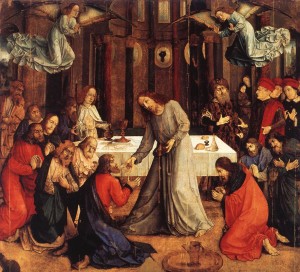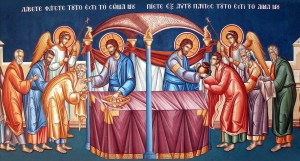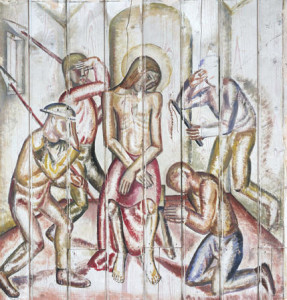Greater love has no man than this, that a man lay down his life for his friends. You are my friends…
Christ worked many wonders during His earthly life, demonstrating a great compassion and tender-heartedness for the poor, the grieving, the sick and neglected. These were signs of God’s love for humankind, to the very least of the Lord’s sisters and brothers.
Yet on our Lord’s own words, the greatest act of His love was not any of His acts of teaching, healing, or even raising from the dead. Rather, all of these signs of love point to His supreme act of love, laying down His life for His sheep. There is no greater love than this act of self-abandonment. “For this reason the Father loves me, because I lay down my life [John 10: 17].”
The liturgy of the Church, according to Sacrosanctum concilium (the constitution on the liturgy of the Second Vatican Council), is an exercise of Christ’s high priesthood. That is to say, it is a re-presentation of this supreme act of love. We who are His Body, enter into this act of self-offering to the Father for the sake of the world when we enter into the liturgy. Here is a quote from paragraph 7:
Every liturgical celebration, because it is an action of Christ the priest and of His Body which is the Church, is a sacred action surpassing all others; no other action of the Church can equal its efficacy by the same title and to the same degree. [emphasis added]
This superlative construction parallels our Lord’s own words that the greatest love consists in the laying down of one’s life for one’s friends. Can it be that our celebration of the liturgy is this action, is this love?
Answering that question depends on active participation. I don’t mean this in the sense in which it is frequently taken, that everyone at the liturgy needs to be speaking, gesturing, helping at the altar, and so on. The Actor is Jesus Himself, not us; we are strictly participants, and we participate–take part–in our “spiritual worship [Romans 12: 1]” when we see, with spiritual eyes, what is actually taking place at the liturgy and its implications for how our lives must change, that we become the sorts of persons who show compassion for the poor, the grieving, the sick and the neglected.

Whoever eats my flesh and drinks my blood has eternal life, and I will raise him up at the last day.
That is to say, in the liturgy “we live Christ,” we are conformed to Christ and become His crucified and resurrected Body. The acts of service that flow from becoming Christ are always a function of being sent, being Apostles who have witnessed the Lord’s sacrifice and resurrected Presence, and wish to point others to this same reality. Just as our Lord’s earthly ministry is meant to help us understand the meaning of His sacrifice on the Cross and point to it, but cannot replace it, our loving service of others must flow from our encounter with Christ at the Cross (meaning at the liturgy), and must be a sign to others to come to believe in the saving power of God in Jesus Christ. Our loving service should draw others to the liturgy (e.g. first of all baptism). This is what the Church means when she says that the Eucharist (the central act and meaning of all of the liturgy) is the “source and summit of the Christian life [CCC § 1324; “fount and apex” as Lumen gentium 11 puts it].”
It remains for us to broaden and deepen our understanding of the liturgy. I have been reflecting mostly on the deepening part over the past several weeks. What do I mean by broadening? I will answer this question in the next post, God willing.

